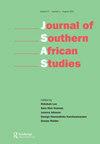南部非洲委员会和非统组织解放委员会:为安哥拉和莫桑比克独立解决内部争端
IF 0.7
4区 社会学
Q2 AREA STUDIES
引用次数: 0
摘要
在非洲-葡萄牙殖民地争取独立的斗争史上,一个重要但令人惊讶地被忽视的角色是国家民族联盟(CONCP),这是一个伞式组织,将几内亚佛得角独立党(PAGC)、几内亚比绍人民解放运动(MPLA)、,安哥拉、莫桑比克自由阵线和圣多美和普林西比自由运动。1961年在卡萨布兰卡成立的CONCP没有参与军事行动,但它加强了运动的意识形态凝聚力和国际外交。其最具争议的目标可能是解决安哥拉和莫桑比克民族主义者之间的内部分歧,并支持安哥拉人民解放运动和弗雷利莫作为他们国家唯一合法的解放运动。为此,它还与南部非洲反对白人少数民族政权的特定民族主义运动以及非洲统一组织(非统组织)解放委员会建立了战略关系。1965年在达累斯萨拉姆举行第二次会议后,刚果民主共和国全国委员会加大了压力,以确保人民解放运动和弗雷利莫得到非统组织的独家承认和支持,但仅在第二次情况下取得了成功。本文章由计算机程序翻译,如有差异,请以英文原文为准。
The CONCP in Southern Africa and the OAU’s Liberation Committee: Settling Internal Disputes for the Independence of Angola and Mozambique
An important but surprisingly neglected player in the history of the struggle for independence in the African Portuguese colonies is the Conferência das Organizações Nacionalistas das Colónias Portuguesas (CONCP), an umbrella organisation uniting the Partido Africano da Independência da Guiné e Cabo Verde (PAIGC), for Guinea Bissau, the Movimento Popular de Libertação de Angola (MPLA), for Angola, the Frente de Libertação de Moçambique (Frelimo), for Mozambique and the Movimento de Libertação de São Tomé e Príncipe (MLSTP), for São Tomé e Príncipe. Founded in Casablanca in 1961, the CONCP was not a participant in military action, but it strengthened the movements’ ideological cohesion and international diplomacy. Its most controversial goals were perhaps the settlement of internal divisions among the nationalists of Angola and Mozambique and the endorsement of the MPLA and Frelimo as the sole legitimate liberation movements in their countries. To this end, it also established a strategic relationship with specific nationalist movements in southern Africa opposing the white minority regimes and with the Organisation of African Unity (OAU) Liberation Committee. After its second conference, held in Dar es Salaam in 1965, the CONCP intensified its pressures to secure the MPLA and Frelimo exclusive recognition and support by the OAU, but it was successful only in the second case.
求助全文
通过发布文献求助,成功后即可免费获取论文全文。
去求助
来源期刊

Journal of Southern African Studies
AREA STUDIES-
CiteScore
1.40
自引率
0.00%
发文量
73
期刊介绍:
The Journal of Southern African Studies is an international publication for work of high academic quality on issues of interest and concern in the region of Southern Africa. It aims at generating fresh scholarly enquiry and rigorous exposition in the many different disciplines of the social sciences and humanities, and periodically organises and supports conferences to this end, sometimes in the region. It seeks to encourage inter-disciplinary analysis, strong comparative perspectives and research that reflects new theoretical or methodological approaches. An active advisory board and an editor based in the region demonstrate our close ties with scholars there and our commitment to promoting research in the region.
 求助内容:
求助内容: 应助结果提醒方式:
应助结果提醒方式:


